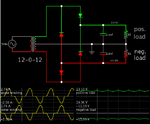hmalissa
Junior Member level 2

- Joined
- Apr 21, 2010
- Messages
- 23
- Helped
- 0
- Reputation
- 0
- Reaction score
- 0
- Trophy points
- 1,281
- Location
- New Jersey
- Activity points
- 1,492
I need a regulated voltage supply with +/-15V output in order to power an instrumentation amplifier circuit. The purpose of this circuit is to avoid a ground loop, so ground needs to be referenced by the application only and not by the power supply.
I am thinking about using a solution with a 7815 and a 7915 regulator, similar to the one shown in figure 6 in https://www.ti.com/lit/ds/symlink/ua7815.pdf. I am wondering if this will do and what kind of voltage supply I need for the +/-20V input. Are batteries the only option? And is the circuit in figure 6 the most suitable solution?
I am thinking about using a solution with a 7815 and a 7915 regulator, similar to the one shown in figure 6 in https://www.ti.com/lit/ds/symlink/ua7815.pdf. I am wondering if this will do and what kind of voltage supply I need for the +/-20V input. Are batteries the only option? And is the circuit in figure 6 the most suitable solution?





